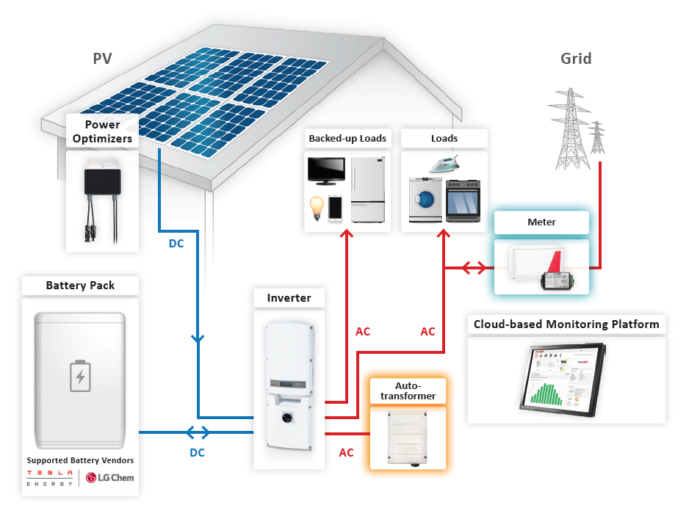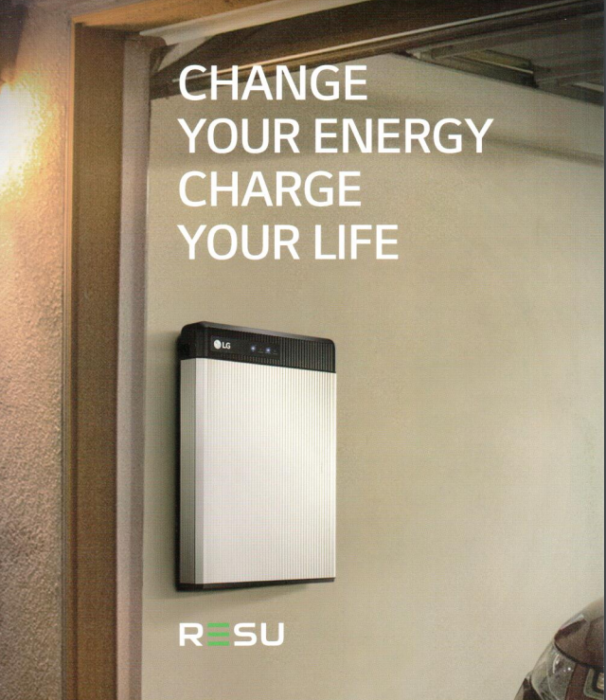Solar Battery Backup System for Home
Storage. The next breakthrough in solar.
Is a Solar Battery Backup System for Home Viable Solution?
Considering a solar battery backup system for your home? Let’s break down why it’s not just a viable solution for power outages, but a smart choice for energy independence and environmental sustainability. Fill out our Free Solar Site Assessment today! 
Solar battery backup systems offer significant advantages over traditional fossil fuel generators. Unlike generators, which rely on combustible fuels, are noisy, and emit pollutants, solar batteries provide clean, renewable energy without any of the drawbacks. Here’s how they stand out:
- Energy Independence: Solar battery systems store excess power generated during sunny days. Whether it’s night or during a power outage, this stored energy ensures your home continues to function seamlessly. This setup not only reduces your dependency on the local utility grid but also ensures that critical devices like refrigerators, TVs, and lights stay on, enhancing your home’s resilience to grid instability.
- Environmental Impact: By choosing solar batteries, you’re tapping into a sustainable energy source. Solar power reduces your carbon footprint and contributes to a healthier environment by avoiding the air pollution associated with diesel or gas generators.
- Cost-Effectiveness: Although there is an upfront investment, solar battery systems can save money in the long run. They can reduce your electricity bills by utilizing stored solar energy during peak tariff hours. Plus, these systems can spin your meter backwards by sending excess energy back to the grid, potentially earning you credits from your utility company.
- Quiet and Clean Operation: Solar batteries operate silently, offering a stark contrast to the loud operation of traditional generators. There’s no worry about disruptive noise, unpleasant odors, or dangerous emissions. This makes them particularly suitable for residential areas where noise can be a significant concern.
- Utilization of Existing Infrastructure: For homes already equipped with solar panels, adding a battery system enhances the functionality of your existing setup. It allows you to maximize the use of your solar panels by storing unused energy that would otherwise go to waste, especially during outages when you cannot normally use solar energy without a battery backup.
Understanding How Solar Batteries Work
Think of solar batteries as large rechargeable batteries for your house. When your solar panels soak up sunlight, they produce electricity. If your house doesn’t need this electricity right away, it doesn’t go to waste. Instead, it gets stored in these batteries. Later, when the sun goes down or it’s cloudy, your house can use this stored energy instead of pulling electricity from the grid. This way, you’re using solar power day and night, rain or shine.

Types of Solar Batteries
There are a few different solar batteries to choose from, each with its strengths.
Different Technologies and Their Applications
Lead Acid batteries are like the ones in cars but designed for homes. They’re good for large solar systems and are more budget-friendly but don’t last as long as other types.
Lithium-Ion batteries, which you might find in laptops or smartphones, are more common for home solar systems. They last longer and can handle more charge and discharge cycles, making them a favorite despite being pricier.
AC vs. DC Coupled Systems
AC and DC refer to types of current in your electrical system. DC (Direct Current) systems are straightforward: solar power is stored directly into batteries as DC and then converted to AC when your home needs it. AC (Alternating Current) systems convert solar power to AC before storing it, which can be less efficient but offers more flexibility in installation and can be easier to retrofit in existing solar setups.
Benefits of a Solar Battery Backup System
Investing in a solar battery backup system brings several significant advantages beyond just lower energy bills. Let’s dive into how it powers homes during outages and the broader environmental and economic benefits.
Powering Your Home During Outages
One of the biggest perks of having a solar battery backup system is that it keeps the lights on when the power goes out. Whether it’s due to a storm or grid maintenance, your home can continue running smoothly using the energy stored in your battery. This is not just convenient but also essential in areas where power outages are frequent or can last a long time.
Environmental and Economic Benefits
Solar batteries make your home greener in more ways than one. Firstly, they reduce the need to rely on fossil fuels, which are typical of traditional backup generators. This means less air pollution and a smaller carbon footprint. Economically, besides lowering your monthly energy bills, solar battery systems qualify for federal tax incentives, making them a financially smart choice. By storing excess solar energy, you can also sell it back to the grid in some areas, earning you credits and further reducing costs.
Choosing a Solar Battery System
Selecting the right solar battery system for your home is crucial to ensure you get the most out of your solar investment. Here’s what you need to consider to make the best choice.
Design Considerations
When planning your solar battery system, think about how much energy your home typically uses, especially during peak hours or in emergencies when you’ll rely solely on the battery. You also need to consider the physical space available for installing the battery—some systems might require more room than you can spare. The climate in your area also affects battery performance and lifespan; for instance, extreme temperatures can reduce efficiency.
How to Choose the Right System for Your Needs
Start by looking at your energy bills to gauge your household’s energy consumption. This will help you determine the size of the battery you need. It’s also essential to think about your future energy needs. Are you planning to buy an electric vehicle or add more electric appliances? This might require a larger capacity battery.
Next, consider the battery’s life expectancy and warranty. A longer warranty period usually indicates a more reliable and durable product. Lastly, think about the manufacturer’s reputation and the service they offer. Choosing a trusted provider like Artisan Electric means better post-installation support.
Capacity and Sizing of Solar Batteries
Choosing the right size and capacity for your solar batteries is essential to meet your home’s energy demands efficiently. Our Free Solar Site Assessment will help us recommend the best solution for your unique needs.
How Many Solar Batteries Are Needed to Power a Home?
The number of batteries you’ll need depends on several factors, including your home’s energy consumption, the size of your solar panel system, and how much backup power you want in case of an outage. As a general rule, larger homes or those with higher energy usage will need more batteries. It’s about finding the right balance to meet your typical daily energy needs.
Can Solar Batteries Power My Entire Home?
Yes, solar batteries can power your entire home, but the extent depends on the system’s capacity and your home’s energy demands. With a properly sized system, you can run all your essential appliances—like lights, fridge, and HVAC system—even when the grid is down. The key is to tailor the battery capacity to match your home’s peak energy requirements.
Maintenance and Lifespan of Solar Batteries
Proper maintenance and understanding the lifespan of solar batteries can help maximize your investment.
How Long Will My Battery System Last?
Solar batteries typically last between 5 to 15 years, depending on the type of battery, how it’s used, and the charging cycle management. Regular usage and proper maintenance can help you reach or even extend the upper limit of this range.
Lifespan and Warranties
Most solar batteries come with warranties that last for a certain number of years or a set number of charge cycles, whichever comes first. These warranties can provide a good indication of the battery’s lifespan and the manufacturer’s confidence in their product. Always check the warranty details to understand what’s covered.
Maintaining Your Battery Backup System
Maintenance for solar batteries is generally minimal, but regular checks are important. This includes ensuring connections are tight, the environment around the batteries is clean and dry, and the system software is up to date. Some advanced battery systems are equipped with remote monitoring, allowing you or your service provider to keep tabs on the system’s performance and address any issues promptly.
Pros and Cons of Solar Batteries
Solar batteries are a powerful addition to any home solar system, but like any technology, they come with their own set of advantages and drawbacks.
Pros:
- Reliability: Solar batteries provide power during outages, ensuring your home remains operational when the grid goes down.
- Energy Independence: Reduce reliance on the power grid and control your own energy usage.
- Cost Savings: Lower your electric bill by using stored solar energy during peak demand times when electricity rates are higher.
- Environmental Impact: Reduce your carbon footprint by using clean, renewable energy.
Cons:
- Upfront Cost: The initial investment for solar batteries can be high, although tax incentives and rebates can help offset these costs.
- Space Requirements: Depending on the size of the system, solar batteries can require significant space for installation.
- Complexity: Installation and integration with existing solar systems can be complex and usually require professional help.
Practical Considerations of Solar Batteries
When thinking about adding a solar battery to your system, there are practical issues to consider to ensure it aligns with your energy needs and lifestyle.
Do Solar Batteries Work During Power Outages?
Absolutely! One of the main reasons homeowners choose to install solar batteries is for their ability to provide power during grid outages. Solar batteries store excess energy generated during the day, which can be used at night or during an outage, keeping critical appliances running without interruption.
Is It Worth Getting Battery Storage with Solar?
For many, the answer is yes, especially if you experience frequent power outages or live in areas with high electricity rates. Adding battery storage to your solar system can maximize your use of solar energy, reduce dependence on the grid, and provide peace of mind knowing that your home will have power during outages.
Moreover, with increasing energy prices and incentives available for solar installations, the return on investment for solar batteries is improving.
Technical Aspects of Solar Batteries
Understanding the technical aspects of solar batteries can help you make informed decisions about integrating them into your home energy system. Two critical components in these systems are the inverters and charge controllers.
Role of Inverters in Solar Battery Systems
Inverters play a crucial role in solar battery systems. Their primary function is to convert the direct current (DC) electricity generated by your solar panels into alternating current (AC) electricity, which is the type of electricity used in most homes.
When it comes to solar batteries, inverters also manage the flow of electricity between the solar panels, battery, and home. Some systems use hybrid inverters that combine this functionality with the ability to charge batteries and manage energy storage effectively. This integration allows for smoother operation and better efficiency of your home’s energy system.
Can You Charge Solar Batteries Without a Charge Controller?
No, a charge controller is essential for safely charging solar batteries. It regulates the voltage and current coming from the solar panels to the batteries. Without a charge controller, the batteries could be overcharged on sunny days, leading to shortened battery life or even damage.
The charge controller ensures that the batteries charge at the correct rate and stop charging when they are full. This not only protects the battery but also optimizes the charging process to make the most of the available sunlight.
Learn more by reading the blog post: Rely On The Sun When The Grid Goes Down!
